Navigating The World Of Jewelry Appraisals: A Comprehensive Guide To Accuracy And Value
Navigating the World of Jewelry Appraisals: A Comprehensive Guide to Accuracy and Value
Related Articles: Navigating the World of Jewelry Appraisals: A Comprehensive Guide to Accuracy and Value
Introduction
With enthusiasm, let’s navigate through the intriguing topic related to Navigating the World of Jewelry Appraisals: A Comprehensive Guide to Accuracy and Value. Let’s weave interesting information and offer fresh perspectives to the readers.
Table of Content
Navigating the World of Jewelry Appraisals: A Comprehensive Guide to Accuracy and Value
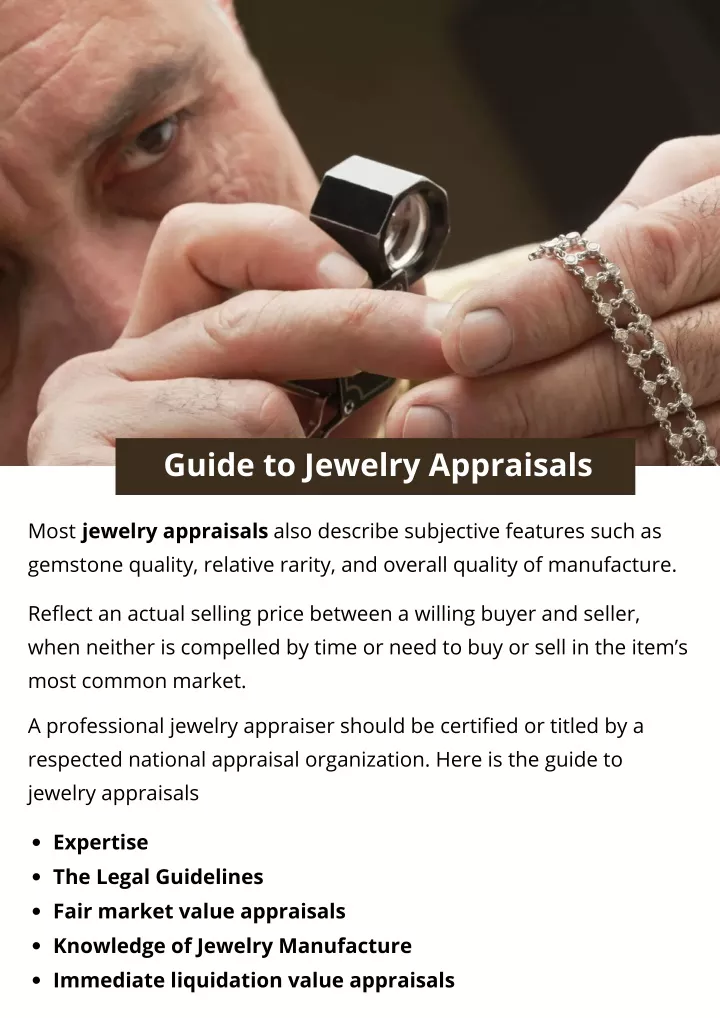
Jewelry appraisals are essential documents that provide a professional assessment of a piece’s value, often used for insurance, estate planning, or even simply understanding the worth of a cherished heirloom. However, the accuracy of these appraisals can be a source of concern for many. This article delves into the intricacies of jewelry appraisals, shedding light on factors influencing their accuracy and providing insights into how to navigate this complex process.
Understanding the Appraisal Process:
A jewelry appraisal is a detailed assessment conducted by a qualified appraiser, typically a gemologist or a certified appraiser with extensive experience in the jewelry industry. The process involves a meticulous examination of the piece, including:
- Identification of Materials: The appraiser determines the type of metal used (gold, silver, platinum, etc.), the quality of the metal (karatage), and identifies any gemstones present.
- Gemological Analysis: Gemstones are analyzed for their quality, including color, clarity, cut, and carat weight. This assessment involves using specialized tools like microscopes and refractometers.
- Design and Craftsmanship: The appraiser evaluates the design, craftsmanship, and historical significance of the piece, considering factors like the era of origin, maker’s mark, and any unique features.
- Market Research: The appraiser researches current market values for similar pieces, considering factors like auction records, retail prices, and trends in the jewelry industry.
Factors Affecting Appraisal Accuracy:
Several factors can influence the accuracy of a jewelry appraisal, highlighting the importance of choosing a reputable and qualified appraiser:
- Appraiser Expertise: A skilled appraiser possesses extensive knowledge of gemology, jewelry history, and market trends, allowing them to provide a comprehensive and accurate valuation.
- Appraisal Methods: Different appraisal methods exist, each with its own strengths and limitations. The chosen method should be appropriate for the specific piece being appraised.
- Market Fluctuations: The value of precious metals and gemstones can fluctuate significantly, making it crucial to obtain a recent appraisal to reflect current market conditions.
- Documentation and Provenance: Accurate documentation, including certificates of authenticity, purchase receipts, and historical records, can significantly enhance the appraisal process.
- Appraiser Bias: While ethical appraisers strive for impartiality, potential biases can arise, especially when appraising pieces with sentimental value or those belonging to family members.
Types of Jewelry Appraisals:
Jewelry appraisals are typically categorized into three main types:
- Insurance Appraisals: These appraisals focus on determining the replacement value of a piece, considering its current market price and the cost of acquiring a similar piece.
- Estate Appraisals: These appraisals are used for estate planning purposes, determining the fair market value of jewelry for inheritance or estate tax purposes.
- Retail Appraisals: These appraisals are often used for selling or purchasing jewelry, providing an estimate of the piece’s current market value.
Tips for Choosing a Qualified Appraiser:
Selecting a qualified appraiser is crucial for ensuring the accuracy and reliability of your jewelry appraisal. Here are some key considerations:
- Credentials and Certifications: Look for appraisers with recognized certifications, such as the Gemological Institute of America (GIA) Graduate Gemologist (GG) or the American Society of Appraisers (ASA).
- Experience and Expertise: Choose an appraiser with significant experience in appraising jewelry, ideally specializing in the type of piece you are having appraised.
- Professional Affiliations: Appraisers affiliated with reputable organizations like the GIA, ASA, or the National Association of Jewelry Appraisers (NAJA) often adhere to strict ethical guidelines.
- Client Reviews and Testimonials: Research online reviews and testimonials from previous clients to gauge the appraiser’s reputation and client satisfaction.
- Transparency and Communication: Choose an appraiser who is transparent about their fees, appraisal methods, and the entire process, ensuring clear communication throughout.
FAQs about Jewelry Appraisals:
1. What is the difference between an appraisal and an evaluation?
An appraisal is a formal document prepared by a qualified appraiser, providing a detailed assessment of a piece’s value. An evaluation, on the other hand, is a less formal assessment that may be conducted by a jeweler or other professional with some expertise in jewelry.
2. How often should I get my jewelry appraised?
It’s recommended to get your jewelry appraised every 3-5 years, especially if you have a significant collection or if market values are fluctuating.
3. Can I get an appraisal online?
While online appraisal services are available, they are not recommended for high-value pieces. It’s best to consult a qualified appraiser in person for a thorough assessment.
4. What should I bring to an appraisal appointment?
Bring any relevant documentation, such as certificates of authenticity, purchase receipts, or any other information that may be helpful in determining the value of your piece.
5. How much does a jewelry appraisal cost?
Appraisal fees vary depending on the appraiser, the complexity of the piece, and the type of appraisal required. It’s best to inquire about fees upfront.
Conclusion:
Navigating the world of jewelry appraisals can be a complex process, but understanding the factors influencing accuracy and selecting a qualified appraiser is crucial for ensuring a reliable and trustworthy assessment. By following the tips outlined in this guide, you can confidently navigate the appraisal process and obtain a valuable document that accurately reflects the value of your treasured pieces. Remember, a well-informed approach is key to maximizing the value and protection of your jewelry investment.
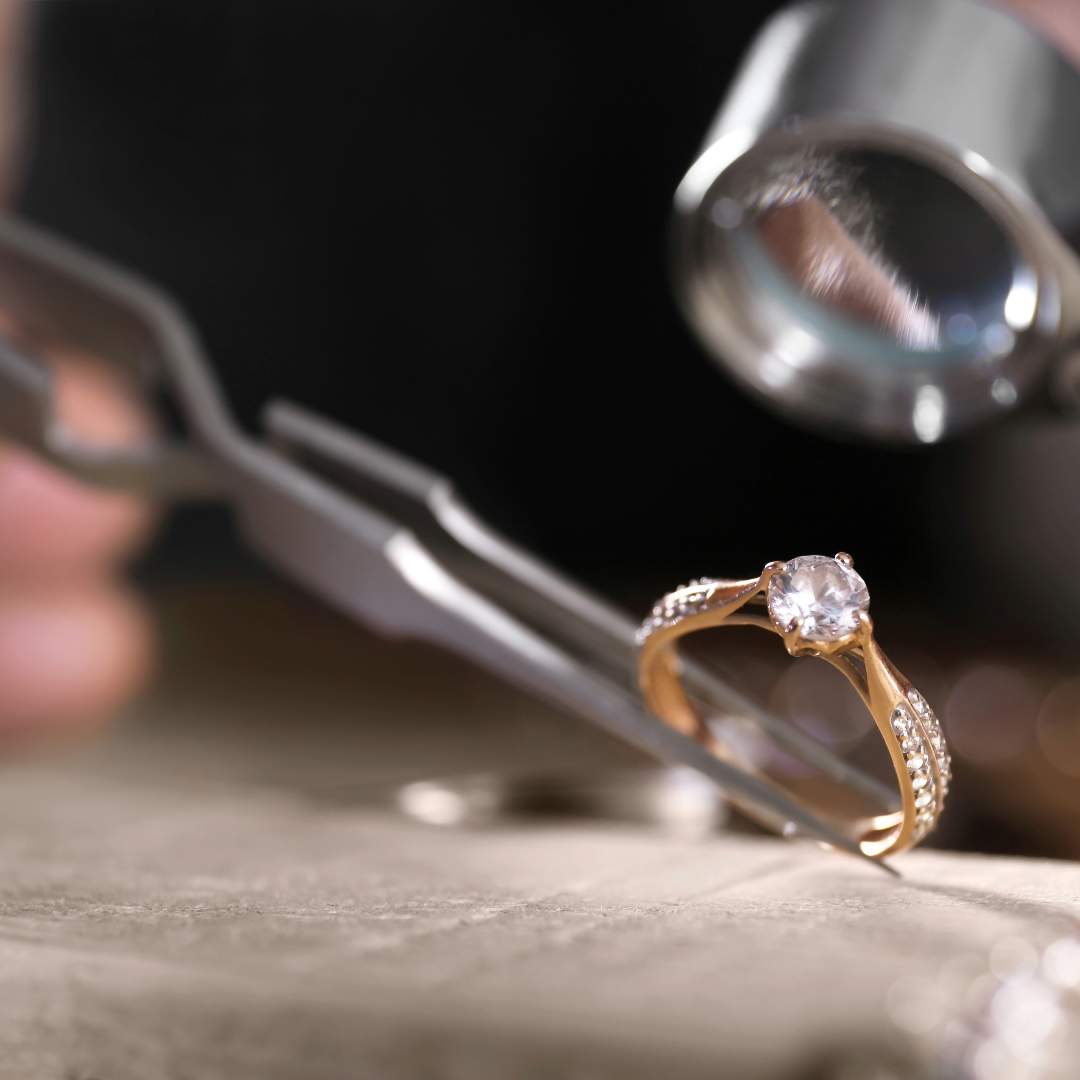
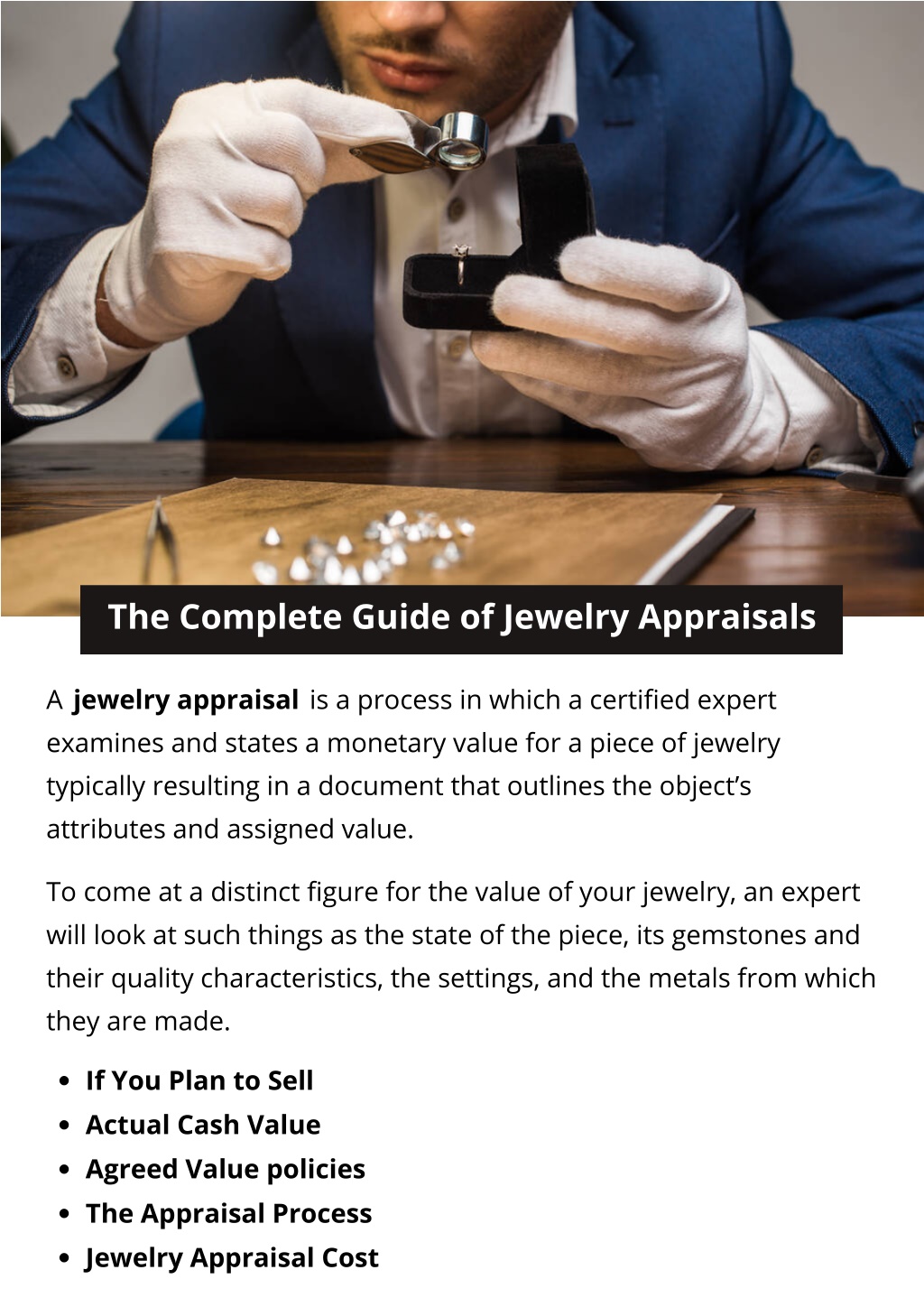


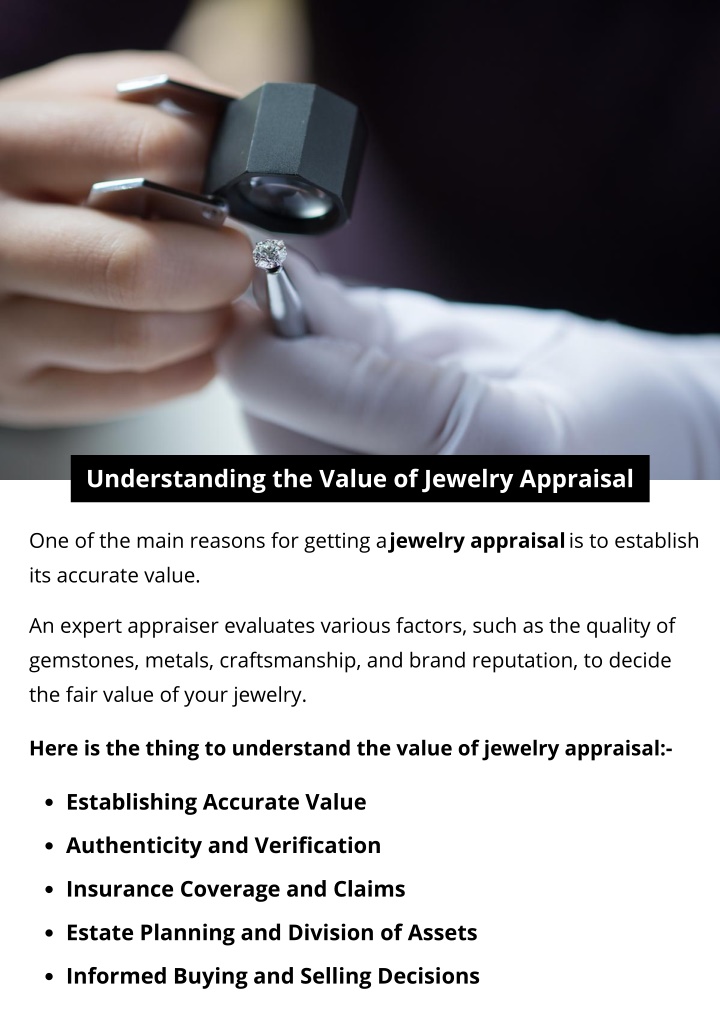

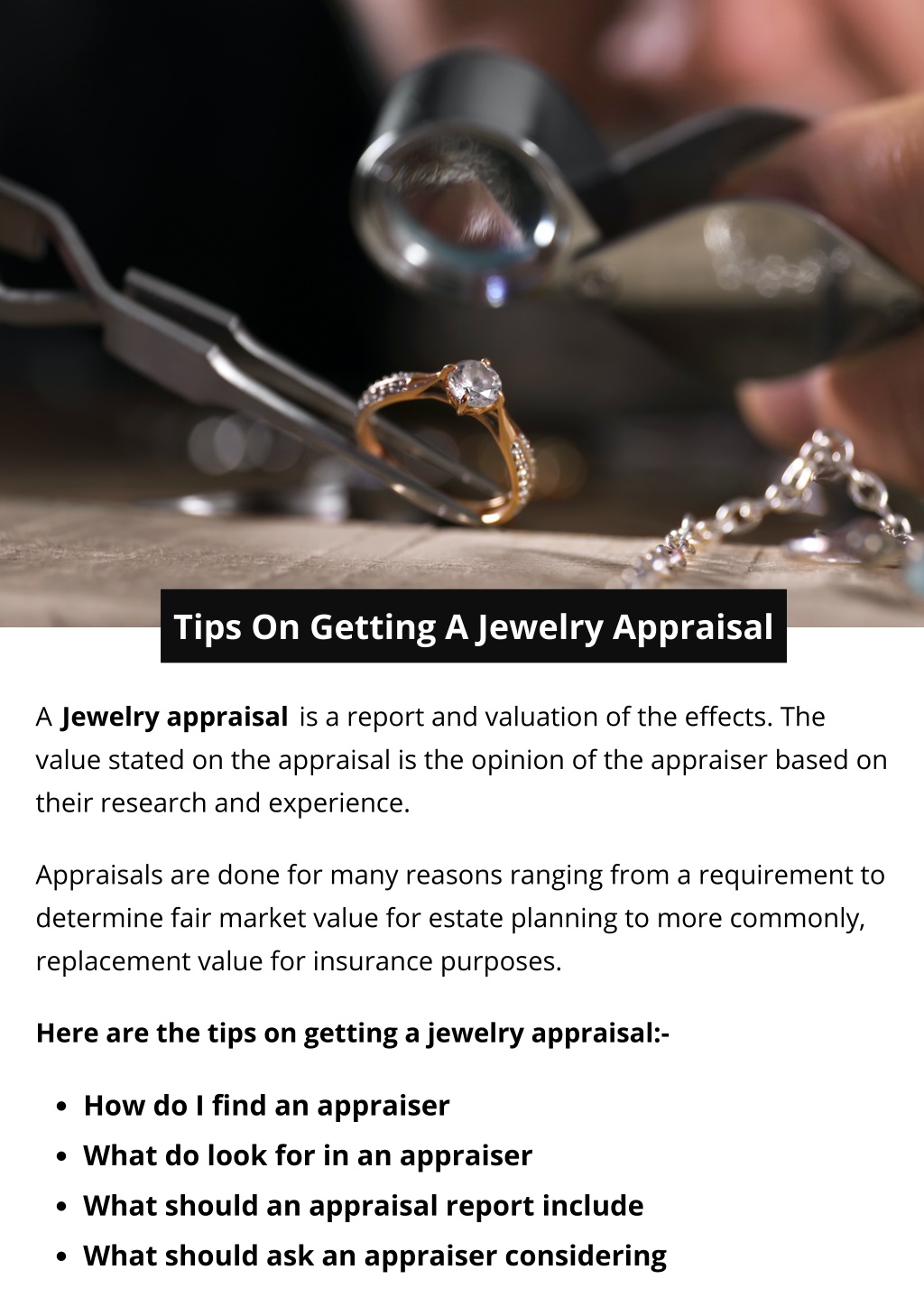
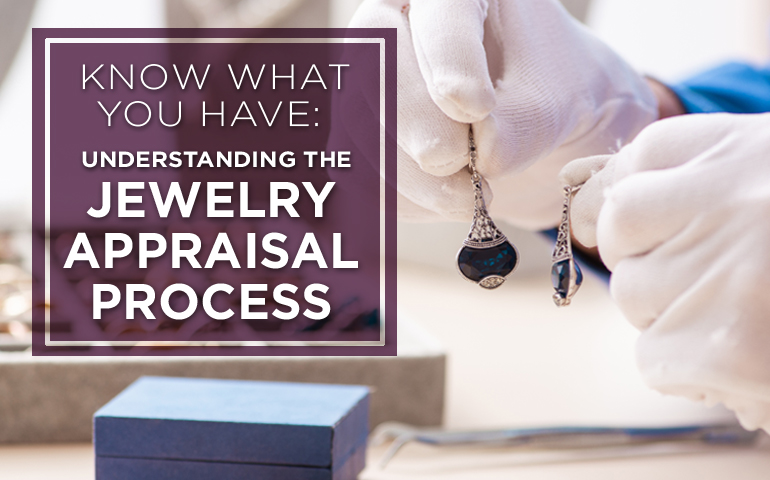
Closure
Thus, we hope this article has provided valuable insights into Navigating the World of Jewelry Appraisals: A Comprehensive Guide to Accuracy and Value. We appreciate your attention to our article. See you in our next article!